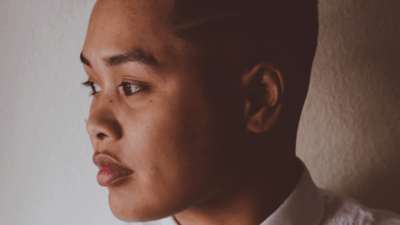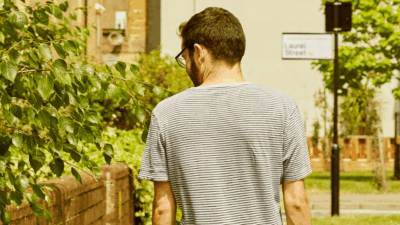
Ban Conversion Practices: Why we need a ban with no exemptions and no excuses
A full ban on conversion practices must include religious settings and protect trans people.
Aged 21, Liam – a trans man – confided in the pastor at his church about having a difficult time with his gender identity and sexuality. When he was offered support, he accepted, not realising that the purpose of this ‘help’ was to prevent him from transitioning and to end his relationships with women. Soon, he was being coerced into thinking that he would go to hell if he transitioned.
“I was told that I'd embraced a lie from the devil…These meetings often revolved around the pastor condemning my gender and sexuality, and citing scriptures that he said proved God’s design was for cis, heterosexual men and women,” said Liam. “Even though I’m unsure what I believe anymore, I still live with the fear that I will go to hell.”
51% of respondents who had been subjected to conversion practices said religious or faith groups had conducted it.
Unfortunately for Liam, this was not an isolated experience. Conversion practices (also known as ‘reparative therapy’) is any practice that seeks to change, 'cure' or suppress a person’s sexual orientation, gender identity, and/or gender expression – and a large proportion of it takes place within a religious or faith-based setting. In fact, the Government’s 2018 National LGBT Survey found that 51% of respondents who had been subjected to conversion practices said religious or faith groups had conducted it.
Conversion practices in religious settings often involve a combination of processes that can range from private or public prayer, to laying of hands. The latter can include a practice described as “beating the homosexuality out of the persons”, often with the use of brooms. LGBTQ+ individuals considered to be ‘possessed’ by the ‘demonic’ spirit of homosexuality may also be subjected to deliverance healing, which can see them forced to drink or bathe in potions deemed “spiritual water”, or even be starved of food and sleep until it is believed that the homosexuality has fled their body.
“When I say I was prayed for, I’m not talking about a quick ‘Our Father’ type prayer,” said George, who experienced conversion practices aged 17, through her friend’s church youth group. “It was lengthy, it was loud, it was two adults shouting and pushing down on my head, forcing me to my knees. It went on and on and they wouldn’t stop until I said I felt a change. I hadn’t been diagnosed back then, but I now know I am autistic, and the experience was totally overwhelming for me.”
No study has ever determined that conversion practices are successful.
While no study has ever determined that conversion practices are successful, there is significant evidence that it can be fatal, and survivors carry the resulting trauma throughout their lives. A 2024 study found that nearly 1 in 6 (16%) LGBTQ+ young people reported being threatened with or subjected to conversion practices, and this was associated with higher rates of mental health concerns. While not all forms of conversion practices involve violence, even talking therapies are a damaging and degrading practice that leave lasting scars on LGBTQ+ survivors.
“During the year I had conversion therapy, I started to self-harm and became very depressed,” said Emily. “It took six or so years before I realised that what had happened to me was conversion therapy, and that it was wrong. Dating has been impossible at times – sometimes I have felt physically sick when starting a relationship because the feelings of ‘I shouldn't be here’ come back so strongly. My pastor’s attempts at therapy might have appeared innocuous, and he may have truly believed he was doing the right thing, but his actions caused me a great deal of harm.”
After being questioned on his gender identity and sexuality in the name of religion, Liam experienced lasting damage to his relationships with others and his perception of self. Research has revealed that trans people are disproportionately impacted by conversion practices, with the Government’s 2018 National LGBT Survey finding that trans respondents were much more likely to have undergone or been offered conversion therapy (13%) than cisgender respondents (7%).
“One of the most destructive impacts was that I began to believe I was unlovable,” Liam said. “After all, if I was being told that even God couldn't bear who I am, then it was, and sometimes still is, difficult to see how I am worthy of love.”
To protect all LGBTQ+ people from significant suffering and trauma, any ban on conversion practices must be holistic and comprehensive.
It’s clear that in order to protect all LGBTQ+ people from significant suffering and trauma, any ban on conversion practices must be holistic and comprehensive. It must protect trans people from gender identity conversion practices and make no excuses for religious activities carried out with the goal of changing or suppressing someone’s gender or sexuality, no matter how innocuous they might appear. Supported by Ahmed Shaheed – the UN Special Rapporteur on Freedom of Religion or Belief – and a wide array of national religious organisations, including the Church of England, Methodists, Quakers, the Hindu Council UK, and the Dhamma Center, we urgently call for a ban not only on conversion practices, but also their promotion. Finally, any legislation put in place must provide support services for current and historical survivors of conversion practices, as well as statutory safeguarding training for all medical and mental health providers, social workers, therapists, and relevant education and justice institutions.



